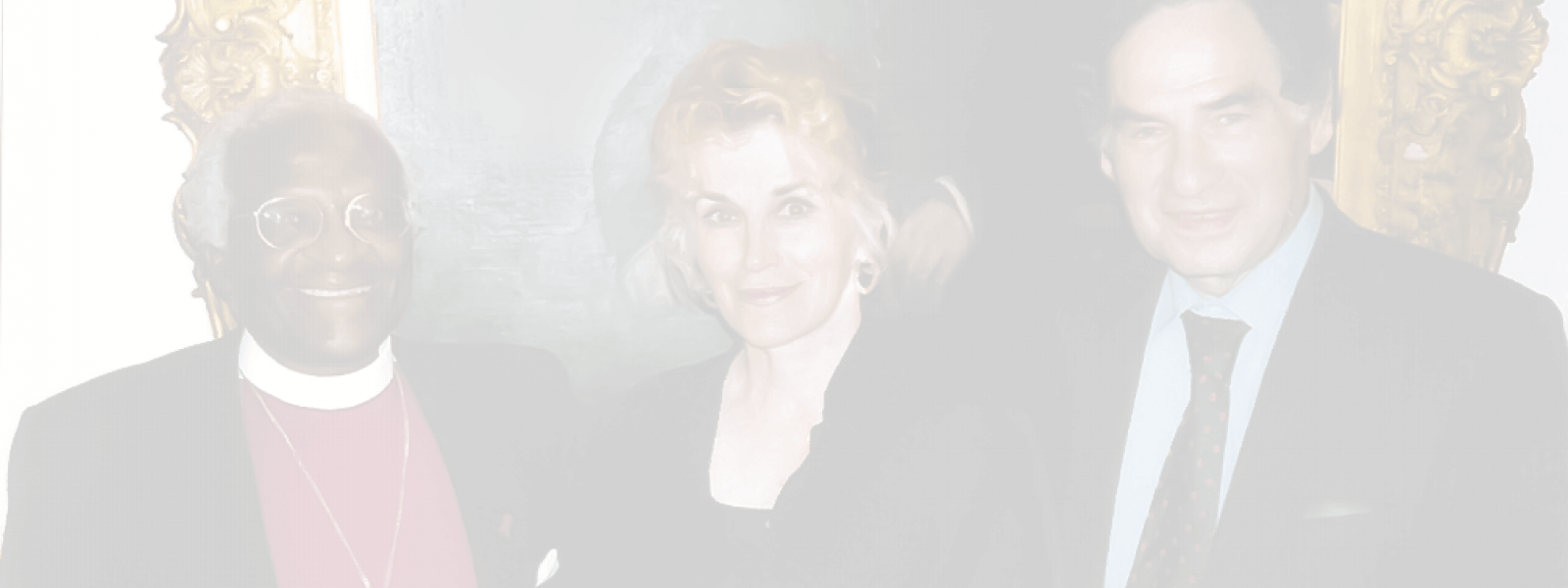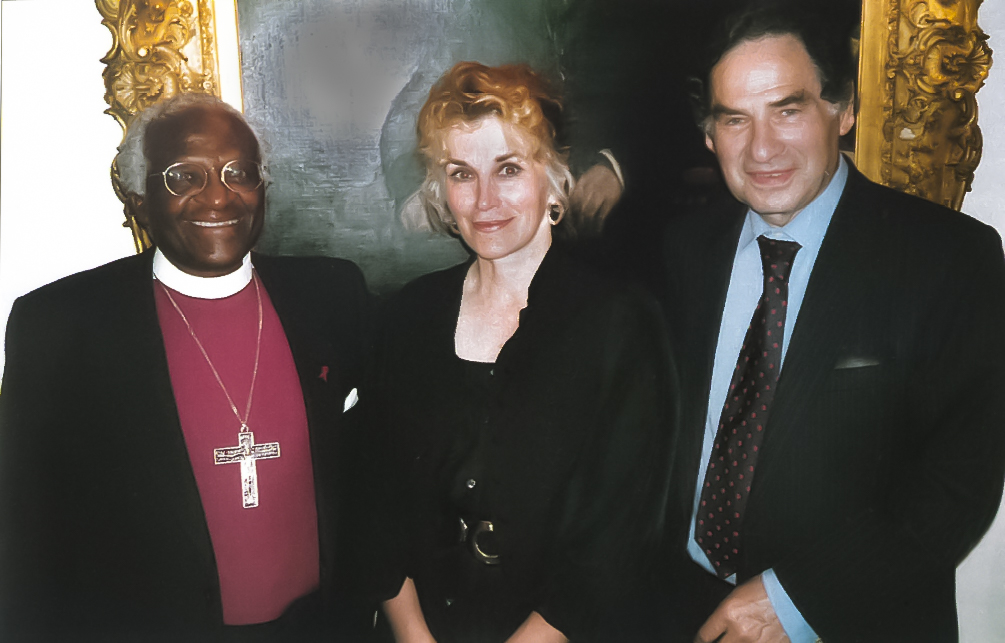The Sidney community is deeply saddened by the passing of Honorary Fellow, the Most Reverend Archbishop Desmond Tutu.
On the evening of 29 June 1999, after receiving the Honorary Degree of Doctor of Divinity from the University, Archbishop Tutu was admitted as a Sidney Honorary Fellow. In making this offer to the Archbishop, the College was conscious of its long connection with South Africa, which arose originally from the High Church tradition that was shared by the Anglican Church in South Africa and by Sidney's Chapel down to the 1960s.
Professor Gabriel Horn, Sidney’s Master from 1992-1999, gave the following speech to welcome Archbishop Tutu:
Archbishop Tutu, members of the College:
Two events are happening this evening, each of which is both nascent and climactic. This evening, Archbishop, you have sat between the Master of the College and the Master-elect. By tomorrow evening the Master-elect will be the Master and the Master of today will become a past Master. A new era in the College will have begun; and there will be great rejoicing - I leave open the question of what the rejoicing will be about. The second event is that you have joined us and in becoming one of us we witness the birth of a new relationship. That relationship is the culmination of a long period of gestation. In 1994 you stood on the balcony of the City Hall in Cape Town, and holding high your hand, clasped in the hand of Nelson Mandela, you presented him to the people of South Africa as its newly elected President. Your country, the country of our ViceMaster and of my wife, has a population of some 40 million people. Until the election that brought you both to that balcony, only four million people had full voting powers; the remaining 36 were effectively disenfranchised. As the monolithic structure of that previous Government began to crack, a few flakes of partial enfranchisement were thrown out; but the voice of 80% of the population, about 32 million people, was still totally excluded from the decision-making processes that controlled their lives.
In 1948 the National Party was successful in the elections and adopted the slogan "Apartheid". I used to pronounce the word in just that way until my wife told me that the correct pronunciation is not "height" but "hate", which describes what many people felt when that Government institutionalised an already existing racial segregation. That institutionalisation was expressed through a series of Acts enforcing the classification of individuals by race, segregating these now defined groups into different geographic locations and eroding civil liberties, with severe punishments for those who infringed the new, draconian laws or who spoke out against them.
You were one of those who spoke out; you led those who spoke out. You headed a peaceful protest march by clergymen, facing the Johannesburg riot squad and all of you were arrested; your bravery in leading that and other marches has to be seen in the context that an armed force faced you, a force that had a history of shooting unarmed men, women and children. And throughout all this provocation, all the indiscriminate arrests, solitary confinements and torture, throughout all this death and destruction, you preached love not hate, you preached reconciliation. But you knew there can be no reconciliation without truth, and so you agreed to chair the Truth and Reconciliation Commission. For over two long years you and your Commissioners listened to harrowing accounts of the human rights violations that took place during the apartheid era. At the end of these hearings, you wrote "Like our Constitution, the Commission has helped in laying the secure foundation for the people of South Africa to transcend the divisions and strife of the past..."
Where does Sidney Sussex come into this momentous sequence of events? Almost exactly 100 years ago, in 1899 a man named John Hicks died. He had for many years been a Fellow of this College and was Bishop of Bloemfontein at the time of his death. In the very same year Ambrose Reeves was born. He was an undergraduate of this College and later, in 1949, he was consecrated Bishop of Johannesburg. He was one of your predecessors in that post. Ambrose Reeves was an outspoken opponent of apartheid and was closely associated with others who spoke out against it. Many of them were arrested and the infamous Treason Trial began. Funds were needed to meet the costs of legal aid and for the accused and support for their families. Ambrose Reeves sought and received that support from the British Defence and Aid Fund for Southern Africa, a fund which later became known as the International Defence and Aid Fund -the IDAF. The Fund openly supported the accused in the Treason Trial -and did so again in the Rivonia Trial at which Nelson Mandela was sentenced to life imprisonment. The Fund earned Nelson Mandela's thanks for saving him and his co-accused from the gallows.
In 1960 came the Sharpeville Massacre when police opened fire on a large crowd protesting peacefully against a law requiring all black people to carry papers, the infamous Pass Laws. Ambrose Reeves condemned this gross act of brutality and in doing so faced arrest and put the lives of his family and himself at risk. He came to England to make sure that people here knew what was happening in South Africa and when he attempted to return he was immediately deported. We made him an Honorary Fellow of the College; and later, while still an Honorary Fellow, he became President of the Anti-Apartheid movement in this country.
But what of the Defence and Aid Fund? The Fund was started by Canon John Collins, also a Sidney undergraduate and later College Chaplain. Even when the South African Government banned the Fund, John Collins arranged for money to be smuggled into the country. For over a quarter of a century the IDAF smuggled some £100 million into South Africa. But John did more than raise funds. For example, during a peaceful protest in Sekekuneland 70 people were arrested and charged with public violence and murder. Of these, 14 were condemned to death. John Collins would not accept these condemnations. When the Governor General of South Africa, Mr C R Swart, was in London, John somehow contrived to get into his hotel suite and appealed to him to exercise his prerogative of mercy. A year later the death penalty was commuted to life imprisonment and an African friend of John's wrote, "I choose to think and believe your dramatic encounter with CR Swart ... had some effect after all".
Other members of the College have helped in other ways to oppose the tyranny of apartheid. For example, John Dugard, who spent two years in postgraduate studies at Sidney and was a Fellow here during the years 1995 through 1997, played an important part in opposing the apartheid laws from his Centre for Applied Legal Studies at the University of Witwatersrand. John Dugard was one of those who framed the new South African Constitution and was one of the creators of the Bill of Rights.
I have referred to some members of the College who played a part in the struggle for freedom in your great country; there were others. And when finally freedom was achieved, without the expected blood bath, all the world wondered. And it was achieved through the leadership given by people such as you, Walter Sisulu, Oliver Tambo and Nelson Mandela. In an address you gave to the Political Committee of the United Nations General Assembly in 1985 you ended by saying: "Apartheid is a threat to world peace. We owe it to future generations to end it. Let us all be part of the exhilarating enterprise of liberating South Africa for all its people, black and white together. We shall be free, all of us, black and white together. And we shall remember who helped us to be free". In becoming an Honorary Fellow of Sidney you honour us doubly, first by joining us and, in so doing, by remembering indeed those of this College who helped in the struggle for freedom.
And last, I have a personal message to give you from someone who sends his warmest greetings. It is a long message so I won't read it all, but he has wonderful memories of you as mentor and guide. He writes: "I am (the good Lord forgive me) a proud man ... proud that I can now include your name among those distinguished persons who have membership of the College where I was privileged to spend 3 happy years .... I am delighted that you are willing, among many Honorary Recognitions, to accept an Honorary Fellowship at Sidney .... Greetings and congratulations on this auspicious day in the 403rd year in the life of the College. This greeting comes with much love to you and also to Leah and all your family." The man who wrote this letter was enthroned Bishop of St Helena by Bishop Selby-Taylor, acting on your behalf. You will have guessed that the letter is signed "John Ruston".
Archbishop Tutu, I want you to think of this community of scholars as your community, and of this College as your home whenever you come to Cambridge. And now may I ask you all to rise and join me in a toast to our new Honorary Fellow, Archbishop Desmond Tutu.
The College sends our deepest condolences to Archbishop Tutu’s family, to the people of South Africa and the many others around the world who will be paying tribute to Archbishop Tutu and his tireless campaign to support human rights.
From left to right: Archbishop Desmond Tutu with Mrs Horn and The Master, 29 June 1999
If you have something that would make a good news or feature item, please email news@sid.cam.ac.uk

